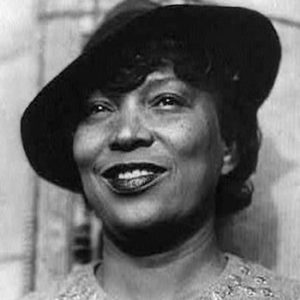
Zora N. Hurston
Zora Neale Hurston, a Black writer and folklorist, was born on this date in 1891.
Born in Notasulga, AL, she grew up in Eatonville, FL., and attended Howard University, Barnard College, and Columbia University, where she studied anthropology. After college, she returned to Florida for an anthropological field study that influenced her later fiction and folklore.
Hurston traveled extensively in the Caribbean and the American South and immersed herself in local cultural practices to conduct her anthropological research. She collected folklore in Jamaica, Haiti, Bermuda, and Honduras. In 1927, she married Herbert Sheen, a jazz musician and former classmate at Howard who would later become a physician, but the marriage ended in 1931. In 1939, while Hurston was working for the Works Progress Administration (WPA), she married Albert Price, a 23-year-old fellow WPA employee, but this marriage ended after only months.
In later life, in addition to continuing her literary career, Hurston served on the faculty of North Carolina College for Negroes (now North Carolina Central University) in Durham, North Carolina.
As a fiction writer, Hurston is noted for her symbolic language, story-telling abilities, and interest in and celebration of Southern Black culture in the United States. Hurston was closely associated with the Harlem Renaissance and has influenced such writers as Ralph Ellison, Toni Morrison, Gayle Jones, Alice Walker, and Toni Cade Bambara. Hurston’s book “Of Mules and Men” remains one of the few writings to chronicle folk tales thoroughly. Her best-known novel is “Their Eyes Were Watching God,” she wrote about a Southern Black woman's search, over 25 years and three marriages, for her true identity.
Hurston's writings include novels, short stories, plays, journal articles, and an autobiography, “Dust Tracks on a Road.” She consistently addressed issues of race and gender, relating them to the search for freedom and equality. In her later years, Hurston experienced health problems, and she died broke and unrecognized by the literary community on January 28, 1960.
In 1975, Ms. Magazine published Alice Walker's essay, "In Search of Zora Neale Hurston," reviving interest in the author. Many of her writings were rediscovered and republished. She was an essential author during America's Harlem Renaissance. In 2002, scholar Molefi Kete Asante listed Zora Neale Hurston on his 100 Greatest African Americans.
Black Women in America: An Historical Encyclopedia
Volumes 1 and 2, edited by Darlene Clark Hine
Copyright 1993, Carlson Publishing Inc., Brooklyn, New York
ISBN 0-926019-61-9